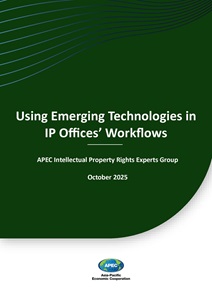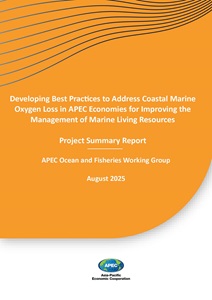
Reports
Using Emerging Technologies in IP Offices’ Workflows
The Asia-Pacific Economic Cooperation (APEC) is a regional economic forum established in 1989 to leverage the growing interdependence of the Asia-Pacific.
The Asia-Pacific Economic Cooperation (APEC) is a regional economic forum established in 1989 to leverage the growing interdependence of the Asia-Pacific.
APEC ensures that goods, services, investment and people move easily across borders. Members facilitate this trade through faster customs procedures at borders; more favorable business climates behind the border; and aligning regulations and standards across the region.
APEC ensures that goods, services, investment and people move easily across borders. Members facilitate this trade through faster customs procedures at borders; more favorable business climates behind the border; and aligning regulations and standards across the region.
APEC works to help all residents of the Asia-Pacific participate in the growing economy.
APEC works to help all residents of the Asia-Pacific participate in the growing economy.
Capacity building projects play an important role in helping translate APEC's goals into reality.
Capacity building projects play an important role in helping translate APEC's goals into reality.

Reports
•August 2025
Download Report
1MB
Published Under
SOM Steering Committee on Economic and Technical Cooperation (SCE), Ocean and Fisheries Working Group (OFWG)
Accessed
359
Pages
24
Ocean deoxygenation poses a significant threat to marine biodiversity, primarily driven by global warming and coastal pollution. Monitoring dissolved oxygen levels is crucial for assessing the health of marine ecosystems, especially along coastlines. However, many exclusive economic zones (EEZs) face data collection and management gaps, hindering science-based policymaking to combat coastal hypoxia and its negative effects on fisheries and aquaculture. The OFWG 201 2023 project, led by the Peruvian Institute of Marine Research (IMARPE), aimed to enhance capacity for monitoring coastal oxygen levels through best practices and biological indices, fostering collaboration among Asia-Pacific economies. This report targets policymakers and stakeholders in fisheries and aquaculture, outlining the impacts of deoxygenation on biodiversity and resources, emphasizing their vulnerability in the Pacific region. It also provides a strategic roadmap to address existing gaps, highlighting key areas for improvement to ensure sustainable management of marine resources amid ongoing oxygen loss.

